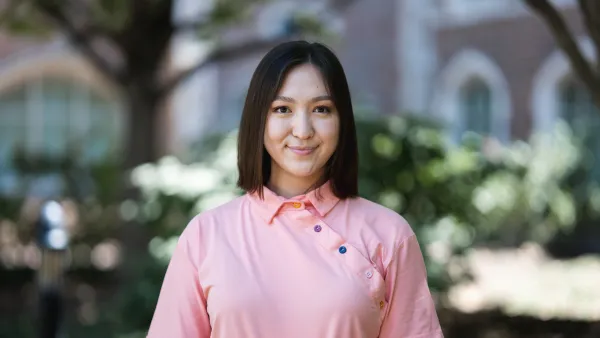Students from this summer's Intro to Physics course recently held the annual Water Rocket Competition, a capstone event fit to bring together a semester of hands-on learning orchestrated by innovative instructor Reza Khanbabaie.
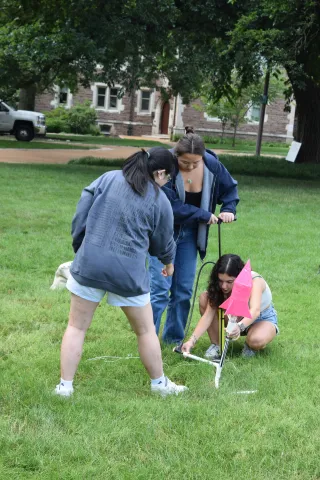
prepare their design for launch
On Thursday, July the 11th, 2024, students from the summer Physics 191 Introduction to Physics course held a capstone event fit to bring together a semester of hands-on learning. This event was the annual Water Rocket Competition, organized by class instructor Reza Khanbabaie and physics department grad student Hamta Farrokhi, and aided by physics faculty Mairin Hynes and staff member Sean Ehle.
A water rocket is a kind of homemade rocket that uses water as a reaction mass and propellant force. The students in Intro to Physics assembled theirs mostly from emptied two-liter soft drink bottles, to which they had grafted homemade finds with duct or masking tape. These rockets are launched from small scratch-made stands using bicycle pumps, which push air into the partially water-filled rocket body, causing the water to pressurize until it is forced out of the nozzle on the tail end of the rocket at high speed. From there, Newton’s Third Law takes over and essentially forces the rocket into the sky.
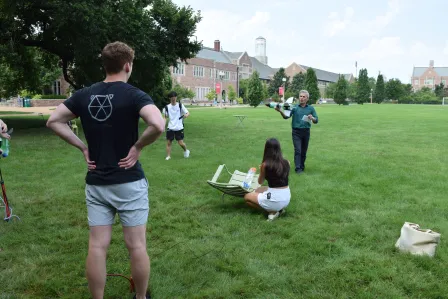
Water Rocket Competition
The competition is the brainchild of Dr. Reza Khanbabaie. Khanbabaie received his PhD in Neurophysics at WashU almost twenty years ago and has since returned at the suggestion of physics graduate student Hamta Farrokhi to teach. Much of his passion for teaching centers on making physics accessible to non-physics majors, a fact highlighted by the fact that in this summer’s class, which was predominantly made up of premed and students from other programs, the level of student participation left him feeling impressed.
“I always thought about a teaching method that students actually enjoy learning physics and have a long-lasting memory of the physics concepts,” he explained of his thought process while he was still in the WashU graduate program. “Many students told me that they enjoyed and learned a lot from these activities, which was the main purpose of my plan for [Water Rocket Competition].” Khanbabaie’s innovative method has already been widely adopted in his native Iran, even up to the level of a national competition, and at the University of British Columbia, where he taught for several years before coming to WashU.
The picture at left shows one side of Khanbabaie’s office in Iran. “I used to invite the talented undergraduate students to my office after the semester and even a few years after their course and graduation to work on new ideas for start-ups,” he says. “We registered 9 patents and 3 start-ups with my undergraduate and graduate students from 2010 to 2018. I believe that activities like these at WashU, which values science and innovation, will build a bridge to future innovators and technologists.”
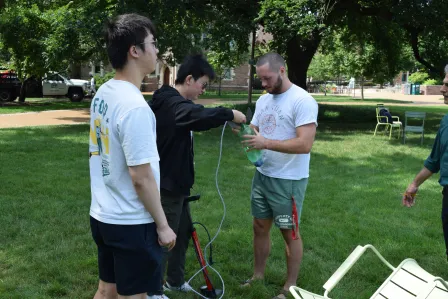
In pursuit of this overarching goal of physics accessibility and engagement, Khanbabaie developed what he calls the Supervised Self-Learning Practical (SSLP) method of teaching. “In this method, I add innovative practical activities in all courses for students to participate, collaborate, and enjoy the learning.” In addition to the Water Rocket Competition (WRC), Khanbabaie has also developed the Physics Hands-On Projects (PHOP) program, which, similarly to the WRC, allows students to get involved with the actual physics of what they are learning, in order for them to not only develop greater knowledge but also to have fun.
“In my lectures, I ask students to build hands-on projects to demonstrate a concept or build a demo better than my in-class demo for a concept,” explains Khanbabaie about PHOP. “Building a device that shows an application of the concept covered in the course in everyday life, or in industrial or medical fields will be highly valued and accepted as a hands-on project.” He pointed out that these optional projects encouraged students to form groups, and that they worked easily for large size classes. He held a PHOP presentation day in the end of each semester for all physics courses. This demonstration took place on July 11th, as well.
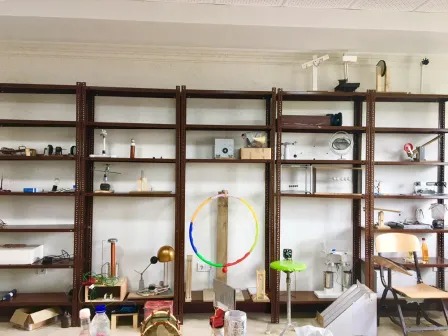
innovative Physics instruction
At this year’s WRC, Khanbabaie and his cohorts oversaw roughly half a dozen groups of two or more students who tested their designs in multiple launches to see whose design would travel the furthest. At least one of these launches went upwards of eighty meters downrange from the impromptu launch site at the eastern end of Mudd Field! The students involved in these launches were excited to see their work come to fruition, and the dedication with which they had designed their rockets was clear.
Looking ahead, it is evident that this sort of hands-on physics instruction will play a major role in invigorating the physics classes of tomorrow, and in bringing more students to these classes starting today. Seeing this particular group of undergraduate students so jazzed up at the thought of seeing who could send their rockets furthest, and truly getting involved in the science of how it happens, makes that clear.



